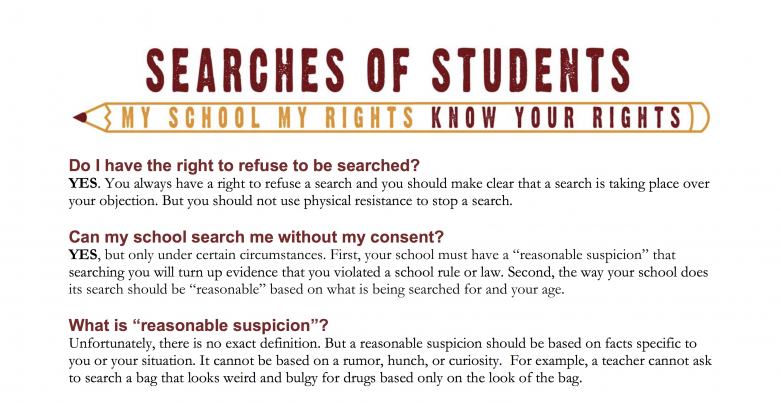

YES. You always have a right to refuse a search and you should make clear that a search is taking place over your objection. But you should not use physical resistance to stop a search.
YES, but only under certain circumstances. First, your school must have a “reasonable suspicion” that searching you will turn up evidence that you violated a school rule or law. Second, the way your school does its search should be “reasonable” based on what is being searched for and your age.
Unfortunately, there is no exact definition. But a reasonable suspicion should be based on facts specific to you or your situation. It cannot be based on a rumor, hunch, or curiosity. For example, a teacher cannot ask to search a bag that looks weird and bulgy for drugs based only on the look of the bag.
YES. But these random searches must be based on special, school-wide needs such as ensuring school safety and should be truly random. A random search cannot be used to target any individual student.
NO. 1
SOMETIMES. If your locker is considered personal property, then your school may not search your locker unless it has a “reasonable suspicion” that it may find something against the law or school rules. But if your locker is considered school property, then your locker can be searched. Your school must give you notice that your locker is school property, such as in student handbooks or posted signs on campus.
YES, but there are limits. Your school may use dogs to search for drugs on school campus, including unattended belongings like backpacks. But it must have a “reasonable suspicion” to search those belongings. If someone at your school tells you to leave the classroom while drug-sniffing dogs conduct a search, you should try to bring your things with you.
YES, so long as the students searched are picked randomly. For example, your school may put a metal detector at the front door to make all students pass through. But if your school wants to single you out for a metal detector search, it must have a “reasonable suspicion” that it will find something against the law or school rules.
USUALLY NOT. Your school may only conduct random drug testing of students who participate in extracurricular activities. Your school cannot force you to take a drug test under other circumstances.
YES, you have the right to refuse a search just as you have that right with school officials.
At a minimum, police officers must have “reasonable suspicion” to search you. And, under some circumstances, they need even more than that.
NO. If school officials or police officers illegally search you, they cannot use what they find against you in court. But your school can use evidence from an illegal search in school disciplinary proceedings.
Endnote:
i California Education Code § 49050